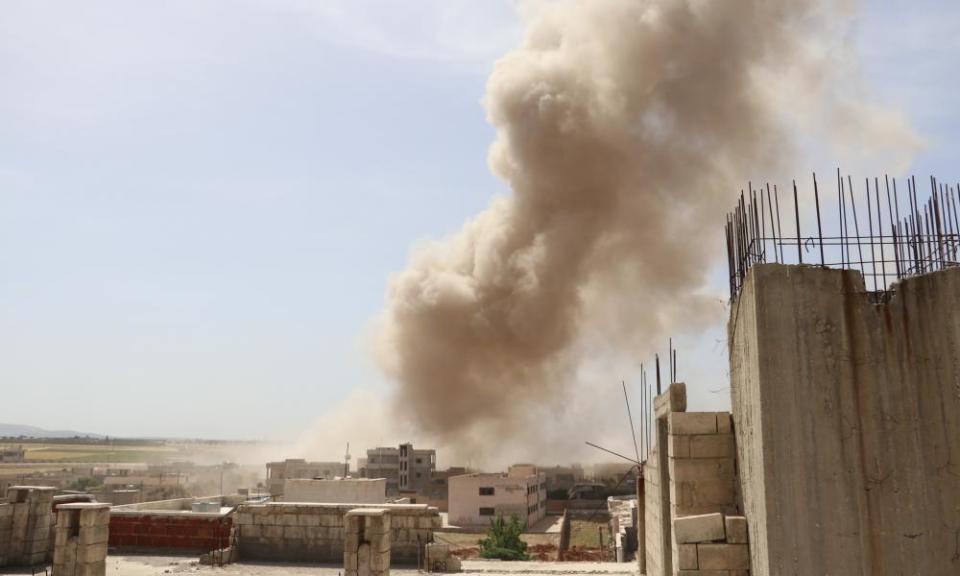'Idlib is a bargaining chip': civilians brace as Assad air assault escalates

Instead of looking forward to the pre-dawn Ramadan meal of suhoor, Dr Firas al-Jundi was cradling his scared children and surveying the damage done to his home by Syrian government airstrikes.
At least 11 people died in the overnight bombing on Wednesday of Maaret al-Numan in Idlib province, the Syrian opposition’s last stronghold in the country, in the latest spasm of violence in an escalated campaign on the area by Bashar al-Assad’s forces.
Most of his home’s windows had been broken, but Jundi’s family escaped shaken but safe. Arriving at his hospital, he immediately began triaging more than 50 injured people. “We are dealing with huge numbers of head injuries, amputations, paralysis cases,” he told the Guardian by phone. “Routine procedures are on hold.”
Idlib and the surrounding countryside are supposedly covered by a de-escalation deal brokered by Russia and Turkey last autumn, which saved the area from an impending regime assault. It has unravelled since January, when control of the area was wrested from more moderate rebel groups by the hardline Hayat Tahrir al-Sham (HTS).

Smoke rises after an airstrike on Wednesday.Photograph: Anadolu Agency/Getty Images
Unlike the scorched earth campaigns in Aleppo, Ghouta and other areas clawed back by Assad with help from his Russian allies, Idlib has been subjected to a limited ground campaign accompanied by airstrikes, carried out under the pretext of destroying HTS.
While the Russian president, Vladimir Putin, has said a full-scale assault on Idlib is “impractical” for the time being, a ferocious new aerial attack began in earnest last month, raising fears that the final battle in Syria’s eight-year war would be a gruelling attritional fight.
Neighbouring Turkey, which backs Idlib’s rebel groups, faces the dilemma of whether or not to absorb any fleeing refugees. Turkey is already home to 3.6 million Syrians and the government is unwilling to provide shelter for potentially millions more.
Aid agencies warned before the ceasefire was brokered last year that an assault on Idlib would put the lives of 3 million civilians in danger and trigger the worst humanitarian disaster of the war to date. Originally home to about 1 million people, Idlib’s population has swollen with civilians displaced by fighting elsewhere in the country, and there is now nowhere else left for them to go unless Turkey opens its border.
Related: Civilians fear 'mass extermination' as bloody assault on Idlib intensifies
The World Health Organization says 18 hospitals in Idlib have been targeted and destroyed by regime bombing and at least 223 people have been killed since 20 April, monitors say. More than 200,000 people have been displaced from their homes by the renewed violence and the majority of aid funding and support has dried up as several organisations halted their work in the area after the HTS takeover.
“We only have two ambulances and one van now,” said Obaida Othman, the head of the civil defence rescue service centre in the town of Kafranbel, which was destroyed in airstrikes on 13 May. “Despite the hot weather we are staying in the outskirts of our town among the trees in order to hide from the warplanes. We are doing our best to survive the purposeful attacks in order to save other lives.”
Rebel forces in the area are fighting back hard, launching a wave of counterattacks to reclaim lost territory on the southern edge of the deescalation zone and shelling Syrian army and Russian positions in neighbouring Latakia. Opposition shelling of government areas in recent weeks has killed at least 25 civilians, according to the UK-based monitor the Syrian Observatory for Human Rights.
“Scorched earth policy, that’s the only language Russia and the regime understand,” said Naji al-Mustafa, a spokesperson for the rebel umbrella group the National Front for Liberation. “We are inflicting losses on the enemy [for their] barbaric crimes against civilians.”

A National Liberation Front fighter in Idlib fires a heavy artillery gun against regime positions on Wednesday.Photograph: Omar Haj Kadour/AFP/Getty Images
Without airpower, however, the longterm odds are not in the opposition’s favour, and Idlib’s fate mainly hinges on the brittle relationship between Turkey and Russia. Moscow has lost patience with Ankara, which failed to contain and disarm HTS in its role as guarantor of last year’s ceasefire.
Idlib has strategic importance for both Russia and Turkey, but it is not either country’s priority in Syria – both are more focussed on the balance of power in the Kurdish-held north-east, where the US is supposedly withdrawing troops.
“Idlib is a bargaining chip at this point and it’s extremely difficult to anticipate what happens next,” said Dareen Khalifa, a senior Syria analyst for the International Crisis Group. “Turkey is maintaining its observation posts in Idlib and has 1,200 troops on the ground there. They don’t show any signs of budging yet. At the same time, Russia can continue to push very hard in Idlib because it strengthens their hand when negotiating with Turkey on other issues.
“Sad as it sounds, given the humanitarian cost, all parties are going to continue to try and destabilise the others.”
Additional reporting by Hussein Akoush

 Yahoo News
Yahoo News 
